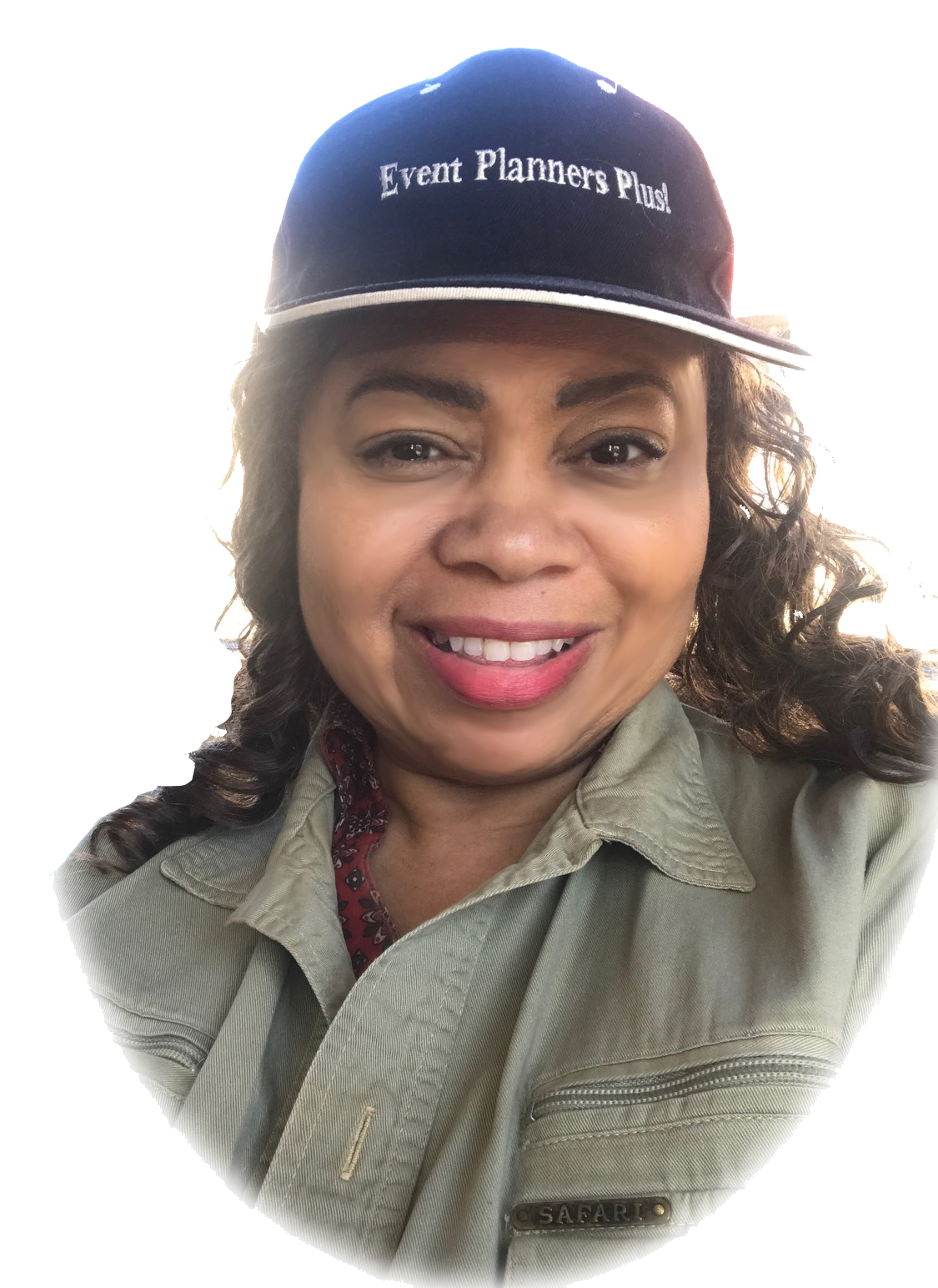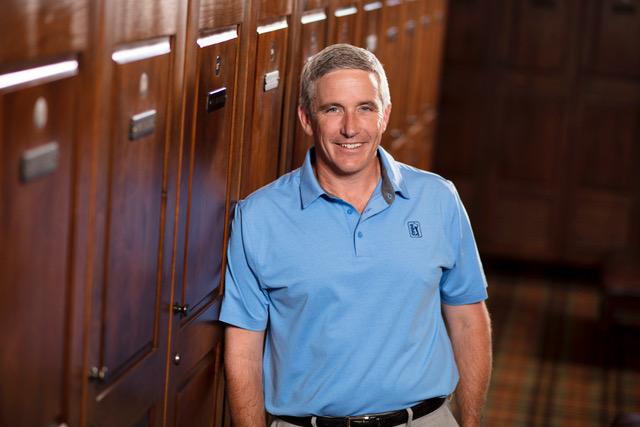
BY MICHAEL WILLIAMS | September 14, 2020
This has been a year like no other in America. First, a global pandemic brought a halt to virtually every aspect of daily life, including professional sports. And then the slaying of George Floyd, Ahmaud Arber,y and Breonna Taylor unleashed a seismic wave of protest that was felt and echoed around the world.
The PGA Tour was affected as much as any of the sports leagues. Commissioner Jay Monahan and his team faced the challenge of how to safely open a league that travels to a different city every week in an environment where many people don’t feel safe leaving their house. And once open, the sport had to compose an effective response to calls for diversity and inclusion despite a lingering reputation for being among the most exclusive of the major professional sports.
I talked with Monahan in an exclusive interview about the turmoil and triumphs in 2020, dealing with the COVID-19 pandemic and how the PGA Tour will make its mark in America’s reckoning on racial justice on and off the course.
Michael Williams:
I just want to start off with a helicopter view of the job of PGA tour commissioner. By my count, there’s only four guys who have held the job in history; how has the job changed? What’s the biggest difference between Dean Beman’s job and the job you have to do every day?
Commissioner Jay Monahan:
Well, I think when Dean took over as commissioner of the PGA tour, in its simplest form, the tournaments themselves were not run by or controlled by the Tour itself. And the media rights for the events were controlled by the tournaments in the local markets. And so in essence, Dean realized that for the Tour to thrive, the tournament’s needed to be, uh, all come underneath the PGA tour and be operated at the direction of the tour. And in order to maximize playing and financial opportunities, those media rights needed to be pooled. And the stroke of genius back then was that as a means of accomplishing that, all of our tournaments were organized for the benefit of charity. And so you fast forward today, and, you know, we generated over, we’ve generated over $3 billion since inception, and that’s such a critical part of what we do every day.
I look to the fact that the game it’s truly a global game; we’ve got 94 players from 29 countries that are participating on our tour of roughly 250 members. We play seven events outside the U.S. You look at our domestic media partnerships with Viacom, CBS, and NBC internationally with Discovery; just the presence and the profile of the Tour is, you know, it’s truly global, it’s a global game. So managing the global business itself and the complexities that come with that is probably what’s different today versus back then, but it’s also just been a natural part of the evolution of the Tour and the game.
Michael Williams:
Let’s talk about the 2020 season. Even though we still have two major championships to go, oddly enough, we’re talking about the close of the 2020 season. Given everything that was going on with COVID-19, are you more surprised that you were able to start this season or that you were able to finish it?
Commissioner Jay Monahan:
I would say that I was probably more surprised that we were able to start and start when we did, just because of all the uncertainty that we inherited when we stepped away during the week of the Player’s Championship. So there was a period there of 30 to 45 days where, you know, you’re trying to reimagine, restructure your schedule. Given that we were stepping away after 24 weeks, we were also trying to do that in the context of “what does this mean for the members of the PGA tour in terms of their eligibility, and is this going to be an official season?”.
And then you had all the safety, health, and safety protocols, so solving those three important issues or challenges, was a significant undertaking. I think, well, I think we just had a number of moments along the way that gave us an indication that we would be able to return in June…and once we were back, we all recognize that we were going to experience some challenges and some setbacks, it’s just the nature of the virus.
 RELATED: Tall List of college sports teams cut because of coronavirus pandemic
RELATED: Tall List of college sports teams cut because of coronavirus pandemic
But we felt like we had a great plan and that there was strong accountability with those that were going to be in our bubble, a bubble that was moving from market to market. And I always felt like we’d get here, but, you know, getting back and starting that week of June 8th, I think that was the most challenging part of the exercise.
Michael Williams:
Are there any policies or procedures that you’ll carry forward into future seasons that you learned from operating in this environment? For instance, some people like the look of the tournaments being played without grandstands around the greens are thousands upon thousands of fans lining the fairways and surrounding the greens. And of course, you love to have the fans there, but is there any discussion about maybe limiting the number of fans at events to improve the fan experience on the course and for the viewers at home?
Commissioner Jay Monahan:
Your example is something I’ve heard from a lot of people about. You look at other sports where you’ve got empty stadiums and they’re doing everything they can to create energy and to bring people virtually or through cardboard cutouts to the venue itself. And while we have not been able to have spectators at our events, I think we have the natural beauty of several hundred acres moving from market to market. But I also think part of the beauty of what happens week in and week out is, the number of fans that we have; it just creates this incredible energy. That’s, I think a big source, of what we experience when viewing the events, but then when you take it away, you, you gain an even greater appreciation for the beauty of the game itself and the beauty of the landscape of these courses.
I think we’ll listen, but for us to be able to make the charitable impact and the community impact that we need to have had [and] that we want to return to, you know, we’re going to need to get back to the way things were. And obviously we can’t wait for our fans to come back and our players can not wait to be playing in front of fans. But to the heart of your question, there is no doubt that there are a lot of learnings that we will apply to the business, you as we go forward. When you operate a certain way for a long period of time, and you can no longer operate that way, you identify inefficiencies, you identify things that maybe you hadn’t been doing that you should be doing.
You think about what the player experiences. For example, a big part of what happens at PGA tour events is amateurs that are playing with professionals on Wednesday, right inside the same field of play. And that experience is a huge part of our economic model. We couldn’t have Pro-ams and haven’t been able to. At the end of the week two going into week three, I get a call on Monday from Bubba Watson in his RV heading from Hilton Head to Hartford. Bubba was mic’ed up on the previous on Sunday with Wesley Bryan, and they had some really good back and forth during that round. We we’re picking up a lot of commentary in the broadcast, and we’ve gotten good feedback on that.
 RELATED: Golf schedule 2020: A November Masters Announced, other majors shuffled due to coronavirus pandemic
RELATED: Golf schedule 2020: A November Masters Announced, other majors shuffled due to coronavirus pandemic
So Bubba says, “Hey, we’re not playing Pro-ams, it’s harder for us to support these tournament organizations. What if we do a charity event on Wednesday where we mic guys up, and I’ll start it off? I’ll pick three guys and we’ll have a match.” And in Detroit [at the Rocket Mortgage Classic] we started it, to raise funds to address the digital divide in the city of Detroit. We raised well over a million dollars. And from that, each week we’ve held an event and our players have been raising their hands [to participate]. Just this past week, we raised a million dollars on Thursday for the East Lake Foundation. So, it’s just little adjustments like that I think are things that you’ll see us continue to find a way to apply as we go forward.
Michael Williams:
Let’s turn to the other large issue of this summer, which is obviously the racial upheaval and reckoning that’s been happening in the country and all over the world. It was interesting to me to find out that you actually convened an inclusion leadership council within the PGA Tour long before this happened this summer. What prompted you to do that? Did you have a premonition that the severe inequalities in society could lead to the type of upheaval that we’re seeing?
Commissioner Jay Monahan:
I was named deputy commissioner of the tour in 2014, and one thing everyone talks about when they talk about the game of golf is that the game of golf is fairly homogenous and we need to diversify our sport. We need to create more opportunities within our sport. And, as an organization, we [at the PGA Tour] also recognized that we wanted to reflect society when you look across our organization. And so the question was, how do we go about understanding where we are organizationally and how do we go about understanding how we can have a bigger impact on our game using our platform? So, that led to the formation of our inclusion leadership council, where we’ve got eight [PGA Tour] executives on the council that my office meets with frequently.
And we’ve looked at everything from our hiring practices to our employee demographics, to our messaging and some of the things that we’re doing to make sure that when we’re talking about the game, we’re celebrating the welcoming and inclusive nature of the game. And so that was the start of our journey. And Michael, [forming the council] was more an inward look to really understand where we were, and then how we could improve, how we could set benchmarks and how we could raise conversations and talk more openly and real about where we were.
And I think the most important thing here is that we’re a culture where we’re celebrating diversity of opinion, diversity of thought. Prior to 2014, and I give my predecessor [former commissioner Tim Finchem] all the credit for this, with the formation of the First Tee, we have been actively trying to make our mark through the First Tee with the establishment of 150 chapters, being in 11,000 elementary schools, and using our platform week in and week out to talk about the life skills that the game of golf can teach you. We have really, again, looked inward at what has happened in society and how that affects us.
We have, as I talked about last week, we are significantly doubling down on using our tournaments and all the markets where we play to identify causes that we think will make an impact on racial and social injustice. And then how do we use this incredible program at the First Tee that makes it certain, that we’re getting into more Title I schools, Title I communities, and getting further into underprivileged and underserved communities. We’re doing good work, and we’ve got a lot more work to do. But I’m really excited about some of the things that we’ve identified that we think could have a huge impact on our game.
Michael Williams:
So, one of the outcomes you announced last week is the $100 million pledge to address racial inequality. Talk a little bit about that, how you decided on, making that a part of your response to the issues of the day, and also talk a little bit about how those funds will be dispersed. How do you determine who’s going to who are going to be the recipients and how do you determine effectiveness?
Commissioner Jay Monahan:
So, when we returned the week of June 8-11, the week [after] George Floyd‘s killing. And for us, I pledged that we were to be part of the solution, pledged to really listen and understand and engage, and try and find a way for us to make an impact. At the time, you really felt like he wanted to do something and do it right away. And it felt like it was important to recognize the fact that we’ve been doing great work and every community where we play for a long period of time. And we needed to go back to our strength. And that is to talk to our tournaments…and keep in mind, we just announced a 50 event schedule for the 2020 2021 season.
 YOU MAY LIKE: PGA Tour Designates 8:46 Tee Time To Honor George Floyd
YOU MAY LIKE: PGA Tour Designates 8:46 Tee Time To Honor George Floyd
As I mentioned upfront, the beauty of our model is that our tournaments are run by what we call host organizations in each community. And those host organizations have business leaders, civic leaders and anywhere from 800 to 3000 volunteers. So they are the pulse of that community and they’ve raised millions of dollars through the years. And we felt like if we could organize, get our tournaments together and pledge to identify a cause that’s specific to their market that they believe can make an impact. And then they make a commitment to, not only raise funds, but to engage with and celebrate those organizations as we go forward.
That is us doing what we’ve always done, applying what we do exceedingly well towards the issue of racial and social injustice. And all of our tournaments very quickly raised their hands and said, “we’re on board and we’re going to get to work”. And so that’s an important part of how we felt like we could make a difference. You know, every market has different organizations and is in a different state; you’re going to get different perspectives on what needs to be done. And we felt being “local” with the organizations was the right way to go about it as one of the things that we’re doing.
 YOU MAY LIKE: Harold Varner III has convo on racial and social unrest with PGA Tour Commissioner Monahan
YOU MAY LIKE: Harold Varner III has convo on racial and social unrest with PGA Tour Commissioner Monahan
Michael Williams:
And I’ve heard that it’s minimum $100 million who doesn’t necessarily need to stop there. I want to ask is about the players themselves. I always think of it as around a hundred different sort of little mini teams in a league. When it comes to messaging on social issues such as this, does it make your job more difficult that you have to manage a hundred “teams” rather than an NFL or an NBA, which has more of an actual team structure and may be a little bit more coordinated in how they message to the public?
Commissioner Jay Monahan:
Well, our players are independent contractors. And when you look at the PGA tour, you’re really looking at about, on average 250 members. I would say that, because our players are independent contractors and, given the nature of our sport, which is so philanthropic-minded, so civic-minded…a lot of our players very early on in their careers, once they start to achieve success, and really success starts when you become a member of the PGA Tour, a large number of our players have either formed their own foundations or are aligned with an organization. And they’re making that their life’s work. You couple that with what we [at the Tour] do each week. There’s so many different causes that we support and our players know that one of the beauties of playing in that event is that they’re going to be contributing to making an impact in that in the community.
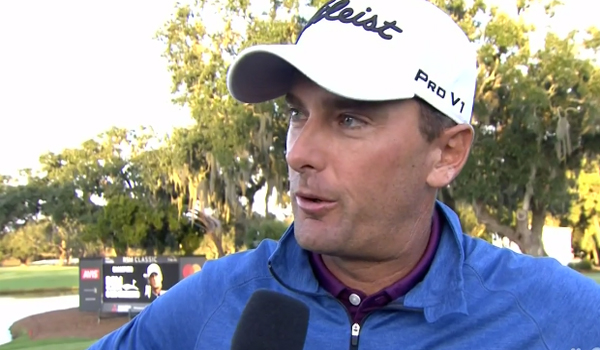 YOU MAY LIKE: CHARLES HOWELL III DONATIONS TO SUPPORT APGA TOUR, GIVING OPPORTUNITIES FOR MINORITIES IN GOLF
YOU MAY LIKE: CHARLES HOWELL III DONATIONS TO SUPPORT APGA TOUR, GIVING OPPORTUNITIES FOR MINORITIES IN GOLF
So I think one of the opportunities that we have is that we’ve got a great working relationship with our players and our players expect and understand that we’re going to identify the causes that are going to help society, help the game, help this organization. And because it’s tied back to our tournaments, they provide incredible support and they’re the reason that we’re able to make that impact. So our players are spending a large amount of their time helping others, and they’re doing it when they’re at home, they’re doing it at tournaments. And when they sign up Friday night at five o’clock the week prior to an event, every one of those players is contributing to a massive charitable and economic impact in every community where we play.
 YOU MAY LIKE: The Economic Impact Of Golf: $84 Billion In The U.S.
YOU MAY LIKE: The Economic Impact Of Golf: $84 Billion In The U.S.
But going back to your question, I think complex societal issues become complex for every business. And what we try to do is communicate and make sure that we’re engaging our players in dialogue, that our players are comfortable talking to us and reaching out to us and sharing their thoughts on issues, sharing their thoughts on what they think can be done. And I’d like to think that there’s a lot of confidence that from them, that they know we’re going to distill that into the right set of actions
Michael Williams:
Tiger Woods is arguably the most influential player in history, which makes him certainly the most influential player of color in history. Have you discussed with him directly and personally his role in implementing the tour’s diversity and inclusion mission?
Commissioner Jay Monahan:
You know, I talk to Tiger about all facets of our business, facets of the game, and he has a world view that’s very valuable to me. And it’s just fun to engage him in dialogue on really any subject. But when you look at Tiger, you go back to 1996, 1997. Tiger, his dad and his family came together and said that providing educational opportunities and providing access to STEM learning was going to be his life’s work. And since that point in time, he has built the TGR Learning Lab out in Anaheim. He has two other physical facilities, and I think 165,000 kids have gone through the program.
Something north of 5,000 teachers have been trained on STEM through their curriculum, trained and certified. And just this past year, I think 114 Earl Woods scholarships were given out four-year scholarships for first-generation college students, 98% of whom are minorities. You look at the tournaments he hosts, from the Genesis Open to the Hero World Challenge.
The amount of time he has given to supporting that work, the amount of financial resources he has provided, his level of engagement in the lives of these kids and knowing where they are and how he can help is…It’s absolutely remarkable. And, you know, there are times when I hear he gets criticized for not being more vocal on issues. And I think everybody handles differently, and their ability to know how they want to talk about how they want to be engaged…we’re all different.
Commissioner Jay Monahan:
We all have different comfort levels. The level of action he has put into helping others is the thing that I focus on. And he continues to do it in ways that people don’t see that I just find to be absolutely remarkable. I know other athletes, you know, the likes of LeBron and others have done incredible work. But Tiger is Tiger. As far as I’m concerned, he has done more than anybody else over an extended period of time that I’ve seen. And it’s something that we’re proud to support.
Michael Williams:
Did he ever talk to you about doing any sort of PSA or something like that? Literally speaking into a microphone about the issues and his feelings on them?
Commissioner Jay Monahan:
We talk about a lot of things. And as you can imagine with, with all of our players, part of the beauty of being able to have a dialogue and discussion and, and get candid feedback on any number of subjects is that I can use that information to shape how we’re going to continue to evolve as a business, but those conversations are conversations obviously that I keep between myself and the athletes. I’ve talked to him about every subject you can imagine as I have with so many of our players,
Michael Williams:
Well, we look forward to being privy to some of those conversations and, at some point in the future, seeing the result of them. One of the things I tell people about the game is that it’s one of the most, uh, prejudice free environments that I’ve ever run across. But still there are moments that inform me and let me know about the homogenous nature of the game that you talked about before . They’re the outliers and the exceptions, but they do exist. Is there a moment or an incidence of racism that you have seen personally in your career or in your personal life that affects and informs your work decisions and your personal positions on issues of race and inclusion?
“I have seen and experienced racism. And I know the difference between right and wrong and that shapes the way I think and the way I lead and the way I try and apply myself to the work I do.”
jay monahan, commissioner, pga tour
Commissioner Jay Monahan:
I grew up in Boston, Massachusetts, outside of Boston, and went to the public school system there. And, as I’ve made my way through life, like so many unfortunately have, I have seen and experienced racism. And I know the difference between right and wrong and that shapes the way I think and the way I lead and the way I try and apply myself to the work I do. And I mean, we’ve all experienced it in our own personal lives. And I think in today’s day and age, where we have with phones and digital platforms and the ubiquitous nature of media, everyone has seen what has happened over the last several months. So I’d just say for us as an organization, it comes down to what can you do in the role that we’re in to make a positive impact on our communities and on the game itself. But I think your question is, have seen or experienced racism in my life? I have.
I think the things in particular that have struck me are my Black colleagues, my Black friends, and the stories that they’ve told me. People share with you the way that they’ve been affected…and because you care, you know…I think life is all about caring for others. When people you love and people you work with and people that you think you fully know, start to share with you ways that they’ve been affected that you didn’t know before…that’s what shakes you. I think those are the most powerful moments. And I think that it’s taken tremendous courage from my colleagues and friends to tell me some of those stories. And I continue to learn from others that are telling their stories, those that I don’t know. And that’s part of, that’s part of how we work through this really challenging time, to try and really listen to what others are saying, others that are impacted ways that, candidly, I have not been. I feel like as a human being, I feel connected and I feel inspired to try and help make a difference.
Michael Williams:
Last question: Put yourself 10 years into the future. If the efforts that you’re implementing and embarking on now are successful, what will it look like 10 years from now; what will be different and significantly changed?
Commissioner Jay Monahan:
First of all, I’d say that as a game, you’ve got the PGA Tour, you have the LPGA Tour, then you have the four major championship organizations, the PGA of America, 29,000 teaching professionals that they represent that run the PGA Championship, Augusta National with the Masters USDA with U.S. men’s and women’s Open. And, the, uh, R&A with the men’s and women’s Senior, uh men’s and women’s Open Championship. Um, and obviously the going back to the PGA, they had the KPMG women’s PGA, but I think as a sport it’s a matter of us [PGA, R&A, USGA, PGA Tour, LPGA, Masters] all working together to make an impact on our industry. But from my standpoint, I would just seeing us be one, being in a position where we can talk market to market about the impact that we’ve had on racial and social injustice through organizations, financial efforts, and in terms our engagement.
I think for the First Tee, it’s a matter of continuing to address some of the disparities or barriers, getting into more underprivileged, underserved communities and putting young kids on a path where they can either continue to play the game, or ultimately continue to want to be in the game and pursue careers in the game. As much success as we’ve had, I think that’s going to be an important part of our evolution. We have supported the Advocate’s Professional Golf Association (APGA) since 2013. We’re now going to be working with the APGA to identify the top five Black college golfers coming out of HBCUs. We’re going to provide them with access and sponsorship to play on the APGA and give them a path to get to the Korn Ferry Tour qualifying school.
And then we’re going to take the great resources we have at the PGA tour performance center and give these players, the best instruction that we have available to us to try and contribute to seeing more minorities, more Black players, continuing to evolve across our tours and ultimately to the PGA Tour. And I think continuing to see more diversification in what you’re seeing inside the ropes and outside the ropes at our tournaments and more people coming into our game is what I hope to be talking about 10 years from now. And I’m not alone. That’s what I think all of us across the organization want. You know, we’ve been restricted with what we can do outside, so there are more and more people playing golf, people that haven’t played the game before.
And the PGA of America and the professionals at each of these courses have been forced to respond in ways that they couldn’t have imagined. But ultimately, I know that the game itself is trying to be as welcoming and inclusive as possible…we want everybody playing this game. It’s such a great game, and that’s going to be a big part of how we’re going to be looked upon 10 years from now, what we did with this opportunity that we had.

Michael Williams is host, CBS Radio Washington, DC, and a contributor for Voice of America, Washington, DC.

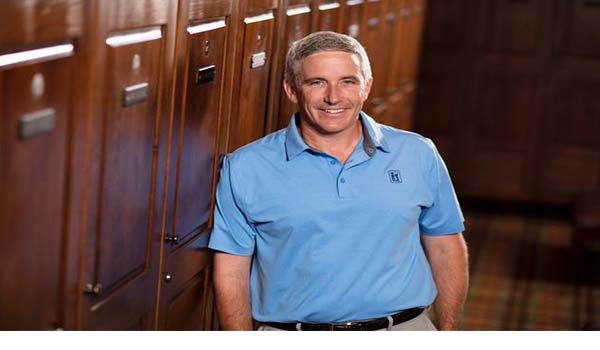
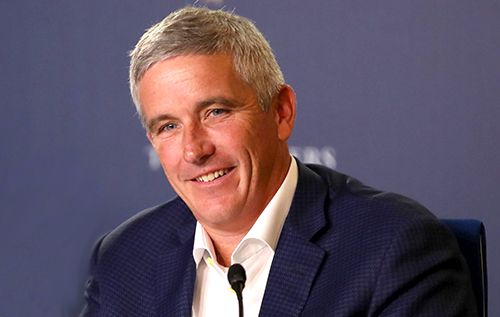 RELATED:
RELATED: 